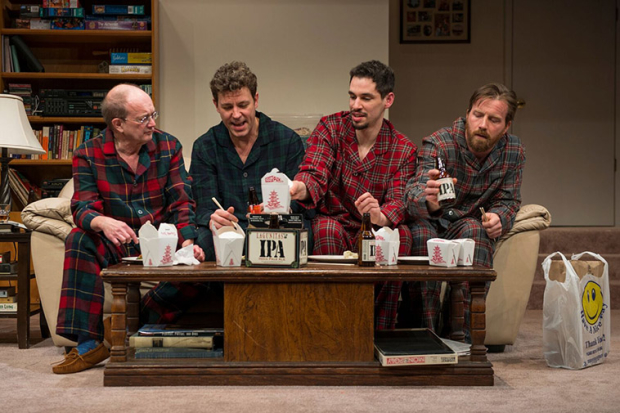Straight White Men

(© Michael Brosilow)
Just from the title, certain audience members may be on their guard when they enter Steppenwolf's Upstairs Theater to see Straight White Men. In a time when ephemeral concepts like "identity politics" are discussed ad nauseam, it's understandable why some would be wary.
However, Straight White Men, written and directed by Young Jean Lee, a Korean-American woman, doesn't scold or criticize its titular demographic, but attempts to presents them impartially, almost like a nature documentary: See the white man as he eats Chinese food out of the carton. Observe the panic in the tribe when a man cries in front of his brothers. The tone is set by a very academic introduction, in which nonbinary performers Elliott Jenetopulos and Will Wilhelm address the audience directly and lay groundwork for some of the basic concepts of the piece: privilege, identity, and expectations.
The main thrust of the action unfolds over a long Christmas weekend, somewhere in the Midwest, in an aggressively beige family room with Hillary Clinton for President signs still pinned up on the wall. Like so many families, this one comes together on Christmas Eve: Ed, a widowed father (Alan Wilder, in a warm and grounded performance), is joined by his three grown sons. The youngest is Drew (Ryan Hallahan), a college professor and rising novelist. The middle child, Jake (Madison Dirks), works in finance and is newly divorced. And Matt (Brian Slaten), the oldest brother who showed so much promise, is working part-time and living back home with dad.
Matt's indolence surprises and worries his family: He was given every advantage by his wealthy, socially conscious, baby boomer parents, and just like his brothers, he was a vibrant, popular, and intelligent kid. Matt went to Harvard, volunteered in Ghana, pursued a Ph.D., and then, without warning or cause, lost his momentum. All the men in the family have their own opinions on where Matt went astray. Ed worries that financial anxieties are stunting him emotionally. Drew thinks he has a chemical imbalance and recommends therapy and medication. And Jake thinks that Matt is self-sabotaging his career as a mea culpa for being born straight, white, and male.
It's easy to see why Matt's family has high expectations for Matt. Slaten's performance is finely layered, with a magnetic personality shining through even as he retreats into complacency. Though his brothers are brasher, they are played with equal finesse. Both Hallahan and Dirks revel in their fraternal physical comedy — and boy, is there a lot of it. Under Lee's direction, the cast goes all-in on (barely) controlled chaos at the drop of a hat, as only siblings can. Squabbles turn into wrestling matches, which turn into dance-offs, which only end with exhaustion and a grudging peace treaty. Though the boisterous episodes can run a little long, they are great fun to watch, aided by their natural believability as a family unit.
The naturalism of the play is aided by the straightforward, representational production design. The set by David Evans Morris, and the costumes by Enver Chakartash are familiar, filled with unassuming beige, navy, and gray hues. It's an appropriate canvas for exploring themes of comfort and complacency.
While the characters in Straight White Men attempt to pull somebody out of his comfort zone, the play doesn't pull its audience too hard or risk alienation. It's provocative, but not incendiary — but most importantly, it is emotionally authentic, with believable characters and a knockout script.











